|
|
|
Sort Order |
|
|
|
Items / Page
|
|
|
|
|
|
|
| Srl | Item |
| 1 |
ID:
110537
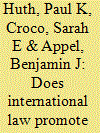

|
|
|
|
|
| Publication |
2011.
|
| Summary/Abstract |
In this article, we explain the role of international law in the resolution of territorial disputes from 1945 to 2000. In doing so, we focus on three outcomes of interest. First, when do states choose to revise the territorial status quo through negotiations instead of force? Second, when are states able to reach a final settlement? Third, when do states prefer a process of legal dispute resolution (i.e., adjudication or arbitration) to bilateral negotiations? To answer these questions, we argue that when the legal principles relevant to the dispute are unambiguous and clearly favor one side, a law-based focal point will emerge. This focal point, in turn, facilitates the settlement process by helping leaders overcome distribution problems, a central obstacle in reaching a final agreement. We find strong and consistent empirical support for our hypotheses regarding international law and peaceful dispute resolution.
|
|
|
|
|
|
|
|
|
|
|
|
|
|
|
|
| 2 |
ID:
023318
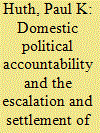

|
|
|
|
|
| Publication |
Dec 2002.
|
| Description |
754-790
|
|
|
|
|
|
|
|
|
|
|
|
|
|
|
|
| 3 |
ID:
039782
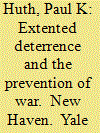

|
|
|
|
|
| Publication |
New Haven, Yale University Press, 1988.
|
| Description |
xi, 227p.
|
| Standard Number |
0300041675
|
|
|
|
|
|
|
|
|
|
|
|
Copies: C:1/I:0,R:0,Q:0
Circulation
| Accession# | Call# | Current Location | Status | Policy | Location |
| 031219 | 355.0217/HUT 031219 | Main | On Shelf | General | |
|
|
|
|
| 4 |
ID:
165434
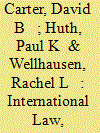

|
|
|
|
|
| Summary/Abstract |
Although contentious interstate disputes are widely known to depress foreign direct investment (FDI), we identify and explain variation in investor responses even to territorial disputes, known to be slow to resolve and prone to militarization. Forward-looking and profit-seeking investors have incentives to increase FDI when the characteristics of a dispute point toward peace. These incentives drive them to increase investment even prior to an actual settlement. Given that legal focal points—when international law identifies one side in the dispute as having a clear legal advantage—promote peace, countries in disputes with legal focal points should receive more FDI. To support this argument, we use new data on international law and territorial disputes from 1980 to 2010 to explain variation in FDI across countries, as well as variation in the timing of within-country FDI accumulation. While a growing body of work demonstrates how international law influences state behavior, we show that it also profoundly influences the investment patterns of firms.
|
|
|
|
|
|
|
|
|
|
|
|
|
|
|
|
| 5 |
ID:
073372
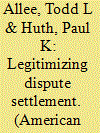

|
|
|
|
|
| Publication |
2006.
|
| Summary/Abstract |
We develop and test a general argument about the conditions under which state leaders are most likely to choose legal dispute resolution over bilateral negotiations as a means to settle international disputes. Our central claim is that leaders who anticipate significant domestic audience costs for the making of voluntary, negotiated concessions are likely to seek the "political cover" of an international legal ruling. In such cases, it will be easier for leaders to justify the making of concessions if they are mandated as part of a ruling by an international court or arbitration body. We test a series of domestic-level hypotheses using a dataset comprised of nearly 1,500 rounds of talks concerning disputed territorial claims. Our multivariate analyses indicate that state leaders opt for legal dispute resolution when they are highly accountable to domestic political opposition, as well as when the dispute is highly salient to domestic audiences.
|
|
|
|
|
|
|
|
|
|
|
|
|
|
|
|
|
|
|
|
|